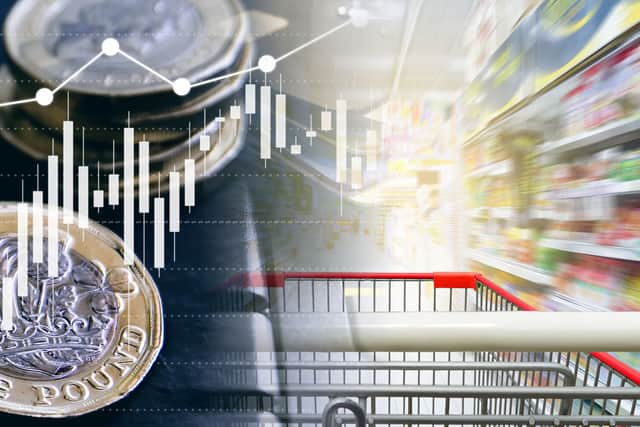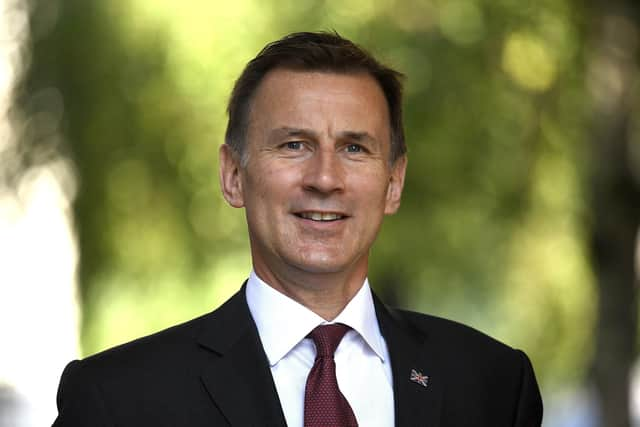UK inflation rate hit 11.1% in October, according to ONS - what is inflation?
and live on Freeview channel 276
UK inflation reached its highest level for 41 years in October due to soaring energy bills, official figures show.
The Office for National Statistics (ONS) revealed that inflation jumped to a higher-than-expected 11.1% in October – the highest rate since October 1981. This was up from 10.1% in September – as gas and electricity costs rocketed, despite Government support limiting the rise in bills.
Advertisement
Hide AdAdvertisement
Hide AdMost economists had been expecting a rise to 10.7%. The ONS said gas prices have leaped nearly 130% higher over the past year, while electricity has risen by around 66%. This meant households and families continue to bear the brunt of the cost of living prices, as prices continue to rise across an array of food items.
The jump in inflation – the biggest leap since March to April when Ofgem’s energy price cap was last changed – comes despite the Government energy support, which has sought to limit annual household gas and electricity bills at around £2,500 a year.


What is inflation?
Inflation is an economics measure that shows how much the price of goods and services have risen over a set period of time. This means that in the last 12 months, according to the ONS, prices have risen by 11.1%.
All western countries use inflation to track how their economies are performing. If the rate is high - as it currently is - it means the cost of living is likely to be rising for people across the UK, which means the value of money is likely to be decreasing.
Advertisement
Hide AdAdvertisement
Hide AdSo, in essence, most of us are poorer than we were a year ago. Rates of inflation constantly shift as a result of several factors, the most important of which include:
- Oil prices: higher oil prices make goods more expensive because it costs more to get them from A to B
- Energy prices: higher energy prices make it more expensive to produce goods and services
- Government policies: major tax cuts can increase spending, which can drive up prices


What has the government said?
Chancellor Jeremy Hunt blamed the impact of the pandemic and Vladimir Putin’s war in Ukraine for the spike in prices as he warned that “tough” decisions on tax and spending would be needed in Thursday’s autumn statement.
“The aftershock of Covid and Putin’s invasion of Ukraine is driving up inflation in the UK and around the world,” he said. “This insidious tax is eating into pay cheques, household budgets and savings, while thwarting any chance of long-term economic growth.
“It is our duty to help the Bank of England in their mission to return inflation to target by acting responsibly with the nation’s finances. That requires some tough but necessary decisions on tax and spending to help balance the books.”
What has Office for National Statistics found?
Advertisement
Hide AdAdvertisement
Hide AdOther new figures from the ONS confirmed fears that the cost-of-living crisis is being felt more acutely by low income households, with latest analysis showing that those families suffered annual inflation of 11.9% last month, while the rate stood at 10.5% for high income households.
“Rising energy and food costs have more bearing on the inflation rate experienced by low-income households, as a greater proportion of their expenditure is spent on them compared with high-income households,” the ONS said. The data showed the rate of inflation across food and non-alcoholic drinks hit 16.4% in October – the highest since September 1977.
Families were hit by soaring costs of staple foods, such as milk, cheese and eggs, while there were also hefty hikes across everyday items such as sugar, tomato ketchup and jam.
Grant Fitzner, chief economist at the ONS, said: “Rising gas and electricity prices drove headline inflation to its highest level for over 40 years, despite the Energy Price Guarantee.”
Advertisement
Hide AdAdvertisement
Hide AdHe added: “Increases across a range of food items also pushed up inflation. These were partially offset by motor fuels, where average petrol prices fell on the month, while the price for diesel rose taking the disparity in price between the two fuels to the highest on record.”
RPI and CPI continue to rise
The data showed lengthy records for the other measures of inflation recorded by the ONS, with the Retail Price Index (RPI) leaping to 14.2% in October from 12.6% in September, while CPI including housing costs (CPIH) rose to 9.6% from 8.8% in September – both the highest since December 1980.
Why is inflation so high?
There are several big reasons for why inflation is so high at the present moment. These include:
- The war in Ukraine: global food prices have been driven up as Ukraine is a major producer of important ingredients, like grain and sunflower oil.
- Sanctions against Russia: western sanctions against Russia, such as the UK oil ban, and resulting retaliation from President Vladimir Putin have thrown energy and fuel supplies into doubt. This has sent global prices soaring as Russia is a major exporter of oil and gas to Europe.
- Global post-Covid recovery: As countries have restarted their economies after emerging from Covid-19 lockdowns, demand for fuel and energy has surged - although this is now becoming less of a factor in the inflation rate
Given the Russia-Ukraine war is likely to continue for some time and there is no immediate solution in sight for the global energy crisis, inflation is expected by economists to continue to remain high before slowly falling back over the next two years. Even when it falls back, it’ll still mean the cost of living is higher than it was before the crisis.
Comment Guidelines
National World encourages reader discussion on our stories. User feedback, insights and back-and-forth exchanges add a rich layer of context to reporting. Please review our Community Guidelines before commenting.
